
- This event has passed.
Commodity Conference
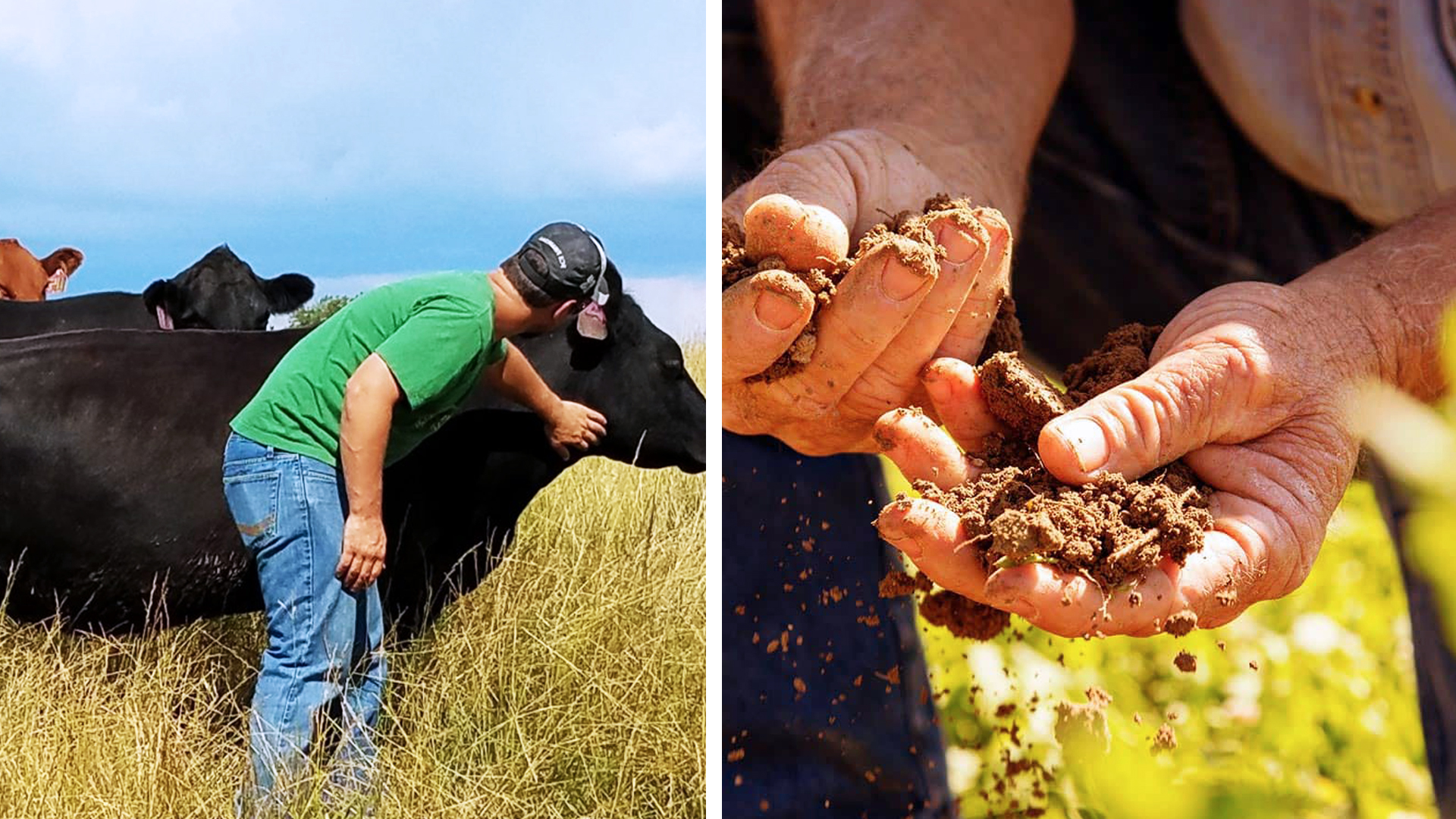
Due to the ongoing COVID-19 pandemic, the 2020 Commodity Conference was held VIRTUALLY.
Recordings
Session 1: Marketing & Consolidation
Dr. Schulz PowerPoint Slides: Download Part 1 Part 2
Dr. Brown PowerPoint Slides: Download
Session 2: The Emerging Carbon Market
Reed PowerPoint Slides: Download Part 1 Part 2 Part 3
Session 3: The Federal Court System is Looming Large Over Agriculture
Cushman PowerPoint Slides: Download
Session 4: Rural Crime in Missouri
Session 5: Crop and Livestock Outlook
Meyer PowerPoint Slides: Download
Session 7: Election 2020 Handicapped
Thursday, August 6
Session 1: Marketing & Consolidation
Welcome and Comments – Blake Hurst, MOFB President
- Dr. Lee Schulz, Livestock Economist & Associate Professor, Iowa State University
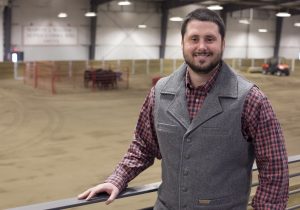 Lee Schulz is an associate professor in the Department of Economics at Iowa State University and serves as the statewide extension specialist on livestock economics and markets. Lee grew up on a diversified crop and livestock farm in central Wisconsin. He has a bachelor’s degree in Agricultural Business from the University of Wisconsin-River Falls, a M.S. in Agricultural Economics from Michigan State University, and a Ph.D. in Agricultural Economics from Kansas State University. His integrated extension, research, and teaching program provides leadership in the study of, and educational programming for, critical problems facing the livestock and meat industry, including marketing and risk management, agricultural and trade policies, animal health and biosecurity, and production, management, and regulatory issues. Lee regularly collaborates with Farm Management Extension, the Iowa Beef Center and Iowa Pork Industry Center, the Center for Agricultural and Rural Development, and industry stakeholders. He publishes regularly in professional journals, extension publications, and the popular press and has spoken at numerous professional and agricultural conferences. Lee has been recognized by the Agricultural & Applied Economics Association and Iowa State University for early achievement in extension and outreach programming.
Lee Schulz is an associate professor in the Department of Economics at Iowa State University and serves as the statewide extension specialist on livestock economics and markets. Lee grew up on a diversified crop and livestock farm in central Wisconsin. He has a bachelor’s degree in Agricultural Business from the University of Wisconsin-River Falls, a M.S. in Agricultural Economics from Michigan State University, and a Ph.D. in Agricultural Economics from Kansas State University. His integrated extension, research, and teaching program provides leadership in the study of, and educational programming for, critical problems facing the livestock and meat industry, including marketing and risk management, agricultural and trade policies, animal health and biosecurity, and production, management, and regulatory issues. Lee regularly collaborates with Farm Management Extension, the Iowa Beef Center and Iowa Pork Industry Center, the Center for Agricultural and Rural Development, and industry stakeholders. He publishes regularly in professional journals, extension publications, and the popular press and has spoken at numerous professional and agricultural conferences. Lee has been recognized by the Agricultural & Applied Economics Association and Iowa State University for early achievement in extension and outreach programming. - Scott Bennett, Director, Congressional Relations, American Farm Bureau Federation
 Scott Bennett serves as the American Farm Bureau Federation’s Director of Congressional Relations. His issue portfolio is comprised of livestock and related issues including GIPSA, cell-based proteins, gene-editing and Mandatory Price Reporting. Scott also manages AFBF’s efforts on hemp, child nutrition/dietary guidelines and agricultural research. Scott has been with the American Farm Bureau Federation since October of 2018.Prior experience includes serving as Legislative Director for former House Judiciary Chairman Bob Goodlatte, where Scott guided the Chairman through policy decisions as a conferee for the 2018 Farm Bill. Before working on the Hill, Scott was an Associate at Keys Group, a D.C. based consulting and lobbying firm representing multi-national food and animal health companies.Scott was born and raised in Red House, VA on his family’s purebred Angus, Gelbvieh and Hereford cattle operation, Knoll Crest Farm. Scott earned a bachelor’s degree in agricultural economics from Virginia Tech, and resides in Arlington, Virginia. He serves on the Board for the Animal Agriculture Alliance, VA 4-H Foundation, and the VA FFA Foundation.
Scott Bennett serves as the American Farm Bureau Federation’s Director of Congressional Relations. His issue portfolio is comprised of livestock and related issues including GIPSA, cell-based proteins, gene-editing and Mandatory Price Reporting. Scott also manages AFBF’s efforts on hemp, child nutrition/dietary guidelines and agricultural research. Scott has been with the American Farm Bureau Federation since October of 2018.Prior experience includes serving as Legislative Director for former House Judiciary Chairman Bob Goodlatte, where Scott guided the Chairman through policy decisions as a conferee for the 2018 Farm Bill. Before working on the Hill, Scott was an Associate at Keys Group, a D.C. based consulting and lobbying firm representing multi-national food and animal health companies.Scott was born and raised in Red House, VA on his family’s purebred Angus, Gelbvieh and Hereford cattle operation, Knoll Crest Farm. Scott earned a bachelor’s degree in agricultural economics from Virginia Tech, and resides in Arlington, Virginia. He serves on the Board for the Animal Agriculture Alliance, VA 4-H Foundation, and the VA FFA Foundation. - Dr. Scott Brown, Director of Strategic Partnerships, CAFNR, University of Missouri
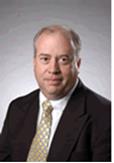 Scott Brown is an associate extension professor in the Division of Applied Social Sciences and the director of strategic partnerships for the College of Agriculture, Food and Natural Resources at the University of Missouri. Scott has worked with U.S. Congress over the past three decades in determining the quantitative effects of changes in dairy and livestock policies and has testified regarding dairy and livestock policy issues before House and Senate Agriculture committees. In addition, Scott works with the Missouri Legislature on the economic effects of state policy options on Missouri agriculture. Scott received his PhD degree in agricultural economics from the University of Missouri and his BS degree in agricultural business from Northwest Missouri State University. Scott grew up on a diversified farm in Northwest Missouri.
Scott Brown is an associate extension professor in the Division of Applied Social Sciences and the director of strategic partnerships for the College of Agriculture, Food and Natural Resources at the University of Missouri. Scott has worked with U.S. Congress over the past three decades in determining the quantitative effects of changes in dairy and livestock policies and has testified regarding dairy and livestock policy issues before House and Senate Agriculture committees. In addition, Scott works with the Missouri Legislature on the economic effects of state policy options on Missouri agriculture. Scott received his PhD degree in agricultural economics from the University of Missouri and his BS degree in agricultural business from Northwest Missouri State University. Scott grew up on a diversified farm in Northwest Missouri.
Session 2: The Emerging Carbon Market
The Emerging Carbon Market – Debbie Reed, Executive Director, Ecosystem Services Market Consortium
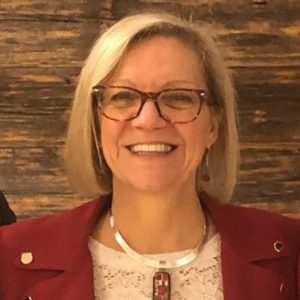
Debbie Reed is the Executive Director of the Ecosystem Services Market Consortium (ESMC). ESMC is a member-based organization launching a national scale ecosystem services market for agriculture to recognize and reward farmers and ranchers for their environmental services to society. ESMC members represent the spectrum of the agricultural sector supply chain with whom we are scaling sustainable agricultural sector outcomes, including increased soil carbon, reduced net greenhouse gases (GHG), and improved water quality and water use conservation. Debbie’s role in leading ESMC builds on decades of experience in agriculture climate change mitigation and sustainability efforts at the national and international level. Debbie previously led the Coalition on Agricultural Greenhouse Gases (C-AGG), a national multi-stakeholder coalition, supporting the development of tools, support systems, knowledge and programs to improve quantification of GHG from agriculture.
Debbie previously worked at the White House Council on Environmental Quality as the Director of Legislative Affairs and Agricultural Policy; and in the U.S. Senate as a Senior Staff on natural resource and agricultural issues for U.S. Senator Robert Kerrey of Nebraska. She held numerous leadership positions at the U.S. Department of Agriculture, including special assistant to the Deputy Under Secretary for Research, Education and Economics (REE), and special assistant to the Administrator of the Agricultural Research Service (ARS). She has graduate and undergraduate degrees in human nutrition/dietetics, chemistry, and communications.
Session 3: The Federal Court System is Looming Large Over Agriculture
The Federal Court System is Looming Large Over Agriculture – Travis Cushman, Senior Counsel for Public Policy, American Farm Bureau Federation
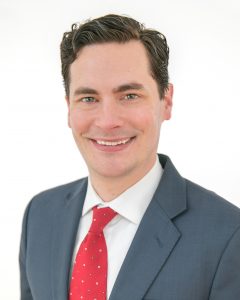
Travis Cushman received his undergraduate degree from the University of Virginia and went to law school at Washington and Lee University School of Law. Originally from Virginia, Travis has lived in North Carolina, Colorado, New York, Ireland, Oklahoma, and Washington, DC. Travis spent 10 years in private law practice before joining AFBF in 2018 as Senior Counsel for Public Policy. In that role, Travis manages AFBF’s nationwide litigation on all issues facing agriculture, including international trade, property rights, access to public lands and crop protection products, and the regulatory regimes of the Clean Water Act, Clean Air Act, and Endangered Species Act.
MOFB Legislative Team Updates
Session 4: Rural Crime in Missouri
MOFB Ambassadors – Chloe Momphard, Lincoln County, and Ben Luebbering, Osage County
Session 4: Rural Crime in Missouri – Darren Haslag, Rural Crimes Unit, Missouri Highway Patrol
Friday, August 7
Session 5: Crop and Livestock Outlook
Welcome and Comments – Blake Hurst, MOFB President
Crop and Livestock Outlook – Dr. Seth Meyer, Associate Director, FAPRI
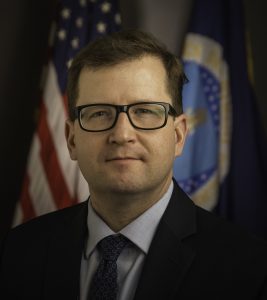
Dr. Seth Meyer is a Research Professor and the Associate Director for the Food and Agricultural Policy Research Institute (FAPRI) at the University of Missouri. FAPRI is well known for is agricultural policy and market analysis being called on by Congress and the United States Department of Agriculture (USDA) for its insight into commodity production, price and trade impacts from various agricultural policies including trade and market disruptions. Dr. Meyer was also most recently the head of the World Agricultural Outlook Board (WAOB), the agency at USDA charged bringing together USDA resources in the assessment of crops around the world. The WAOB also publishes those finding in the ‘WASDE’ report which is closely watched by agricultural markets here and abroad. Seth was also an economist with the Food and Agricultural Organization (FAO) of the United Nations and has served as a visiting scholar at several research institutions around the world
Session 6: A Court Report
A Court Report – Zel Fischer, Associate Judge, Supreme Court of Missouri
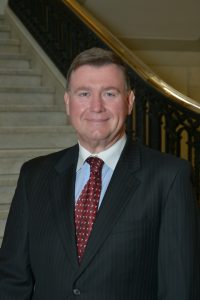 Honorable Zel M. Fischer was appointed to the Supreme Court of Missouri October 2008 and retained by the voters in the November 2010 general election for a 12 year term expiring December 31, 2022.
Honorable Zel M. Fischer was appointed to the Supreme Court of Missouri October 2008 and retained by the voters in the November 2010 general election for a 12 year term expiring December 31, 2022.
Prior to becoming a Judge on the Supreme Court of Missouri, Judge Fischer was a trial judge and trial lawyer in Northwest Missouri where he was born and raised and still resides today. He graduated from William Jewell College with majors in political science and philosophy, receiving the Harry S. Truman most outstanding Political Science Major, and was honored by William Jewell College with the Citation for Lifetime Achievement. He received his law degree with distinction from the University of Missouri-Kansas City School of Law.
Judge Fischer formerly served on the Board of Directors of the Conference of Chief Justices. He is an ASTAR/NCSI Fellow, which is a select group of judges from around the country who have special training and education to preside over complex cases involving difficult science and technology issues. Judge Fischer is President of the National Courts and Sciences Institute, which is a not-for-profit organization dedicated to training judges in Science. The NCSI Board of Directors selected him to be the President and chair of the Executive Committee. He also serves as a member of the National Advisory Board for the University of North Carolina Bryson Center for Judicial Science Education. Judge Fischer is a frequent lecturer to judges and lawyers regarding the intersection of science and the law as well as constitutional issues and professional ethics and he is also actively involved in presenting Constitutional Forums at high schools, colleges, and universities, where he impresses upon the students the prominent importance of protecting the rights guaranteed by the Constitution.
Session 7: Election 2020 Handicapped
Election 2020 Handicapped – Henry Olsen, Washington Post columnist and Senior Fellow at the Ethics and Public Policy Center
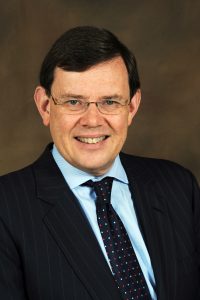 Henry Olsen is a Washington Post columnist and a senior fellow at the Ethics and Public Policy Center Olsen began his career as a political consultant at the California firm of Hoffenblum-Mollrich. After three years working for the California Assembly Republican Caucus, he returned to school to become a lawyer. Following law school he clerked for the Honorable Danny J. Boggs on the United States Sixth Circuit Court of Appeals and as an associate in the Philadelphia office of Dechert, Price & Rhoads. He then joined the think tank world where he spent the next eighteen years as an executive at a variety of institutions, serving as the President of the Commonwealth Foundation, a Vice President at the Manhattan Institute, and as Vice President and Director, National Research Initiative, at the American Enterprise Institute. He left AEI in 2013 to pursue a career in political analysis and writing at EPPC. During that time his work has appeared in variety of leading publications in America and the United Kingdom. He is the author or co-author of two books, “The Working Class Republican: Ronald Reagan and the Return of Blue-Collar Conservatism” and (with Dante J. Scala) “The Four Faces of the Republican Party”. His biennial election predictions have been widely praised for the uncanny accuracy, and he is a frequent guest on television and radio programs. Olsen regularly speaks about American political trends and global populism in the United State, Europe, and Australia.
Henry Olsen is a Washington Post columnist and a senior fellow at the Ethics and Public Policy Center Olsen began his career as a political consultant at the California firm of Hoffenblum-Mollrich. After three years working for the California Assembly Republican Caucus, he returned to school to become a lawyer. Following law school he clerked for the Honorable Danny J. Boggs on the United States Sixth Circuit Court of Appeals and as an associate in the Philadelphia office of Dechert, Price & Rhoads. He then joined the think tank world where he spent the next eighteen years as an executive at a variety of institutions, serving as the President of the Commonwealth Foundation, a Vice President at the Manhattan Institute, and as Vice President and Director, National Research Initiative, at the American Enterprise Institute. He left AEI in 2013 to pursue a career in political analysis and writing at EPPC. During that time his work has appeared in variety of leading publications in America and the United Kingdom. He is the author or co-author of two books, “The Working Class Republican: Ronald Reagan and the Return of Blue-Collar Conservatism” and (with Dante J. Scala) “The Four Faces of the Republican Party”. His biennial election predictions have been widely praised for the uncanny accuracy, and he is a frequent guest on television and radio programs. Olsen regularly speaks about American political trends and global populism in the United State, Europe, and Australia.
2020 Election Preview – MOFB Legislative Staff
Session 8: Missouri’s Political Leaders
Lt. Governor Mike Kehoe
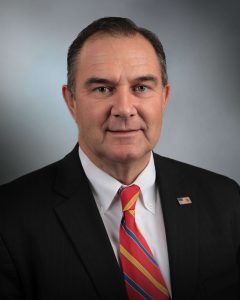
Mike Kehoe became Missouri’s 48th Lieutenant Governor on June 18, 2018.
Prior to serving as Lieutenant Governor, then Senator Kehoe represented the Sixth Senatorial District, where he served as both Assistant Majority Leader and Majority Leader.
Lieutenant Governor Kehoe has been honored by the Missouri Cattlemen’s Association, the Missouri Association of Electric Cooperatives, and many others for his legislative accomplishments. As a businessman – he received the Time Magazine Quality Dealer Award, Ford’s President Award, and was inducted into the Automotive Hall of Fame.
Community service is critical to Lieutenant Governor Kehoe as well – serving as chairman of the Jefferson City Chamber of Commerce, two-time United Way Fund Drive Chairman, and multiple other community organizations. He remains active in community business development and youth development efforts.
Lieutenant Governor Kehoe and his wife, Claudia, have called mid-Missouri home for more than 30 years and are the proud parents of four children. Lieutenant Governor Kehoe remains a small businessman at heart, never forgetting the lessons learned at Osage industries and Mike Kehoe Ford-Lincoln. In addition to his public service, he enjoys work at his beef cattle production business located on the family farm in Phelps County.
Governor Mike Parson
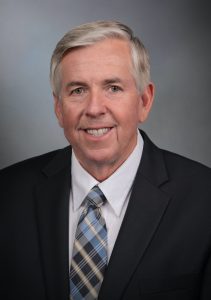 Hard work and a commitment to helping others have been the driving force for Governor Michael L. Parson’s public service. Sworn in as Missouri’s 57th Governor on June 1, 2018, Governor Parson pledged to move Missouri forward with common sense, trust, honor, and integrity. Raised on a small farm in Hickory County, it was here that Governor Parson first learned the value of hard work, being a good neighbor, and being a good steward of the land. A third-generation farmer, Governor Parson continues to own and operate a cow and calf operation near Bolivar.
Hard work and a commitment to helping others have been the driving force for Governor Michael L. Parson’s public service. Sworn in as Missouri’s 57th Governor on June 1, 2018, Governor Parson pledged to move Missouri forward with common sense, trust, honor, and integrity. Raised on a small farm in Hickory County, it was here that Governor Parson first learned the value of hard work, being a good neighbor, and being a good steward of the land. A third-generation farmer, Governor Parson continues to own and operate a cow and calf operation near Bolivar.
Missouri is moving forward under the leadership of Governor Parson. Prior to COVID-19, our state was experiencing a historic and booming economy. Unemployment was at a record low and wages were on the rise. Governor Parson signed the largest income-tax cut in Missouri history and knows that training our workforce is key to securing great jobs for all Missourians.
Now, Governor Parson is working hard to get Missouri back to work and lead our state through the greatest economic comeback that we’ve ever seen in Missouri history.
Our state’s future is bright, and Governor Parson works every day to make sure that Missouri stays on the right path so that our sons and daughters can live the American Dream.

